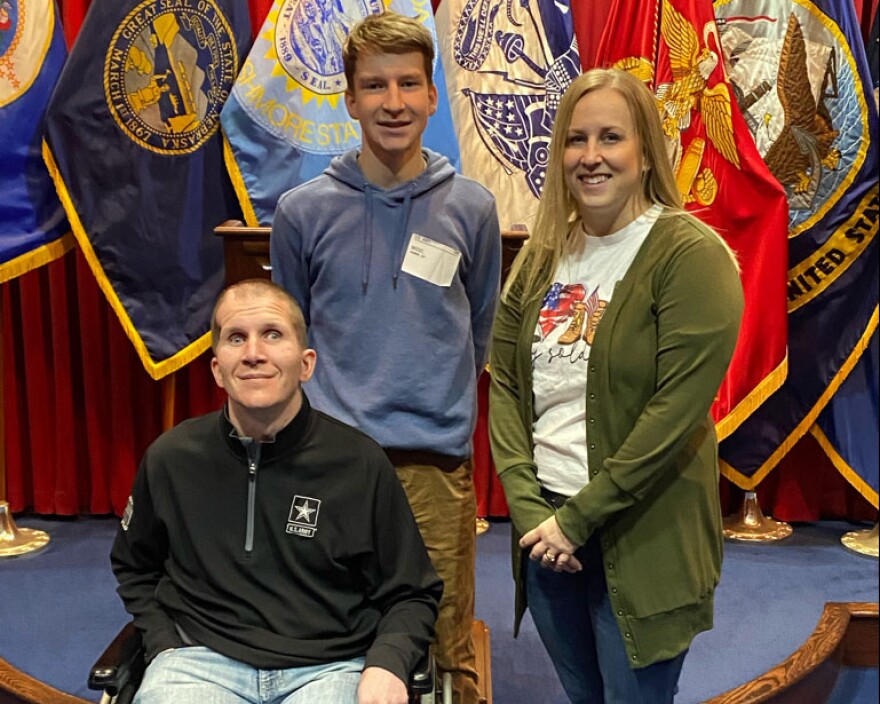In 2005, National Guardsman Corey Briest survived a roadside bomb blast that killed three of his fellow service members in Baghdad. He returned home to South Dakota blind and dependent on a wheelchair — with a severe traumatic brain injury.
According to his wife Jennifer, most of his mental faculties are intact. He helps his children with schoolwork, takes an interest in household finances, and keeps track of family birthdays.
“I don't care if you remember what you had for lunch an hour ago, or what the date is today. Like, you remember the important things,” she said.
But because of his injuries, the Department of Veterans Affairs told the Briests that they needed to appoint a fiduciary, someone to manage Corey’s financial affairs. And as a result of that determination, a VA field examiner told Corey he could no longer own or possess guns.
“Corey was like, ‘Well, wait. I have my grandpa's gun. It was handed down to me. I'm going to hand it down to my son one day,’” Jennifer recalled. “The field examiner was so rude about it. Wasn't compassionate to Corey. Wasn't explaining things. He was just like, ‘Nope, you can't have that…that's against the law.’”
The examiner’s visit left Corey distraught, Jennifer said, because he felt as though the VA was taking something more away from him because of his injuries. The couple stored the heirloom weapon with extended family.
The VA's policy is to report vets to the FBI’s background check system, known as NICS, if they have been declared incompetent to manage their finances. That system screens most firearm purchases.
The VA cites a federal law that forbids gun ownership among people who are unable to take care of their affairs due to “marked subnormal intelligence, or mental illness, incompetency, condition, or disease.”
“Many of the people that are reported under these systems are a danger to themselves or others. We just simply don't know which ones,” said Lindsay Nichols, federal policy director with the Giffords Law Center to Prevent Gun Violence. “So these include individuals with dementia, serious mental illnesses, bipolar disorder, severe brain trauma. These disabilities alone don't make a person dangerous. But combined with easy access to guns because they can endanger the public.”
But detractors argue that the VA’s criteria for identifying financial incompetence are unclear and that the appeals process is lengthy and difficult. Stacey-Rae Simcox of the Veterans Legal Clinic at Stetson University said the VA should have to go to court to take someone’s gun rights away.
“Every other American gets that benefit except for the ones who signed up to defend the United States of America,” she added. “That doesn't make any sense.”
Simcox said difficulty with finances isn’t a reliable predictor of danger.
“VA doesn't determine that veterans are mentally incompetent — just financially," she said. "They do it regularly enough that a lot of veterans are afraid to even go for mental health benefits or care at the VA because they're worried they're going to lose their right to carry a firearm and protect themselves.”
Based on what Simcox has seen from her clients, she said she believes that the fiduciary process is sometimes triggered when a veteran goes in for a VA claim exam — otherwise known as a compensation and pension (C&P) exam — and not by routine medical visits or therapy. The C&P exam is used to evaluate conditions for disability compensation.
The VA said in a statement that it does a rigorous review before reporting veterans to the background check system.
“Claims processors at the Veterans Benefit Administration (VBA) assess and determine if a Veteran who is eligible to receive funds is also considered mentally incapacitated and cannot manage their finances and VA benefits," VA spokesman Terrence Hayes said in a statement. "VA conducts such evaluations when VA receives either medical evidence or declaration by a court of jurisdiction that clearly and convincingly shows that the person is incapable of managing their VA benefit payments without limitation."
At a press conference in late January, VA Secretary Denis McDonough maintained that the agency’s approach is sound.
“The standard that is applied related to the fiduciary responsibilities is a standard that we take great care with, that has been developed over much time and is meant to address a very delicate situation,” he said. “As in all things that we try to do here, it’s in the best interest of the veteran.”
Congress is considering overriding the VA policy. Democrat Jon Tester of Montana pushed a measure through the Senate last year that prohibits federal funds from being used to report veterans to the background check system without a judge’s order declaring them a danger.
McDonough was adamant that veterans should feel safe seeking care at the VA.
“I worry, as I've told members of Congress, that there is a mis-impression about how VA treats conversations between a veteran and the veteran’s health care provider. Those are confidential conversations,” he said.
McDonough’s office did not answer questions about how the fiduciary appointment process is triggered. It also declined to say how often the agency reports veterans to the background check system and how many of those veterans appeal.
This story was produced by the American Homefront Project, a public media collaboration that reports on American military life and veterans.




